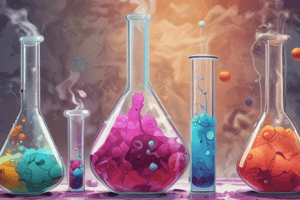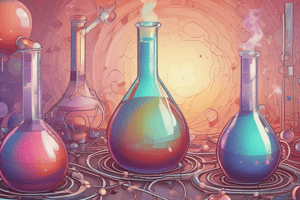Podcast
Questions and Answers
What is the primary difference between a decomposition reaction and a combustion reaction?
What is the primary difference between a decomposition reaction and a combustion reaction?
- Decomposition reactions always release energy, while combustion reactions always absorb energy.
- Decomposition reactions are always exothermic, while combustion reactions are always endothermic.
- Decomposition reactions occur at room temperature, while combustion reactions occur at high temperatures.
- Decomposition reactions involve the breakdown of a single compound, while combustion reactions involve the reaction of a substance with oxygen. (correct)
What is the process by which an atom, molecule, or ion loses one or more electrons?
What is the process by which an atom, molecule, or ion loses one or more electrons?
- Decomposition
- Reduction
- Oxidation (correct)
- Combustion
What type of reaction occurs when an acid reacts with a base to produce a salt and water?
What type of reaction occurs when an acid reacts with a base to produce a salt and water?
- Oxidation reaction
- Combustion reaction
- Displacement reaction
- Neutralization reaction (correct)
What type of reaction involves the exchange of partners between two compounds?
What type of reaction involves the exchange of partners between two compounds?
What type of reaction occurs when a more reactive element displaces a less reactive element from a compound?
What type of reaction occurs when a more reactive element displaces a less reactive element from a compound?
What is the necessary condition for a decomposition reaction to occur?
What is the necessary condition for a decomposition reaction to occur?
What is the characteristic of a combustion reaction?
What is the characteristic of a combustion reaction?
What is the result of an oxidation reaction?
What is the result of an oxidation reaction?
Flashcards are hidden until you start studying
Study Notes
Chemical Reactions
Decomposition Reaction
- A reaction where a single compound breaks down into two or more simpler substances
- Example: 2H2O → 2H2 + O2
- Often requires energy input, such as heat or light
Combustion Reaction
- A reaction where a substance reacts with oxygen to produce heat and light
- Example: 2CH4 + 3O2 → 2CO2 + 3H2O
- Often involves the release of energy in the form of heat and light
Oxidation Reaction
- A reaction where an atom, molecule, or ion loses one or more electrons
- Example: 2Cu + O2 → 2CuO
- Often involves the gain of oxygen or the loss of hydrogen
Neutralization Reaction
- A reaction where an acid reacts with a base to produce a salt and water
- Example: HCl + NaOH → NaCl + H2O
- Often involves the combination of hydrogen ions (H+) and hydroxide ions (OH-)
Displacement Reaction
- A reaction where a more reactive element displaces a less reactive element from a compound
- Example: Zn + CuSO4 → ZnSO4 + Cu
- Often involves the replacement of one element with another
Double Displacement Reaction
- A reaction where two compounds exchange partners, resulting in the formation of two new compounds
- Example: NaCl + AgNO3 → NaNO3 + AgCl
- Often involves the exchange of ions between two compounds
Chemical Reactions
Decomposition Reaction
- A single compound breaks down into two or more simpler substances, often requiring energy input
- Can be represented by a general equation: AB → A + B
- Energy input can be in the form of heat, light, or electricity
Combustion Reaction
- A reaction between a substance and oxygen that produces heat and light
- Often involves the release of energy in the form of heat and light
- Can be represented by a general equation: Fuel + Oxygen → Products + Heat + Light
Oxidation Reaction
- Involves the loss of one or more electrons by an atom, molecule, or ion
- Can be represented by a general equation: 2A → 2A+ + 2e-
- Often involves the gain of oxygen or the loss of hydrogen
Neutralization Reaction
- A reaction between an acid and a base that produces a salt and water
- Can be represented by a general equation: Acid + Base → Salt + Water
- Involves the combination of hydrogen ions (H+) and hydroxide ions (OH-)
Displacement Reaction
- A more reactive element displaces a less reactive element from a compound
- Can be represented by a general equation: A + BC → AC + B
- Often involves the replacement of one element with another
Double Displacement Reaction
- Two compounds exchange partners, resulting in the formation of two new compounds
- Can be represented by a general equation: AB + CD → AD + CB
- Often involves the exchange of ions between two compounds
Studying That Suits You
Use AI to generate personalized quizzes and flashcards to suit your learning preferences.




